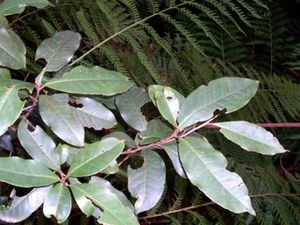Possumwood facts for kids
Quick facts for kids Possumwood |
|
|---|---|
 |
|
| Quintinia sieberi - juvenile growing in the Grose Valley, Australia | |
| Scientific classification |
|
| Kingdom: | Plantae |
| Clade: | Tracheophytes |
| Clade: | Angiosperms |
| Clade: | Eudicots |
| Clade: | Asterids |
| Order: | Paracryphiales |
| Family: | Paracryphiaceae |
| Genus: | Quintinia |
| Species: |
Q. sieberi
|
| Binomial name | |
| Quintinia sieberi A.DC.
|
|
| Script error: The function "autoWithCaption" does not exist. | |
Script error: No such module "Check for conflicting parameters".
The Possumwood (scientific name: Quintinia sieberi) is a special type of tree found in the rainforests of eastern Australia. It usually grows in high places, like mountains. You can find it from the Clyde River in New South Wales up to the McPherson Range in Queensland.
Contents
What Possumwood Looks Like
The possumwood tree is a medium-sized tree. It can grow up to 25 meters (about 82 feet) tall. Its main stem, called the trunk, can be as wide as 75 centimeters (about 30 inches).
The bottom of the trunk often has wide, strong parts that look like supports. These are called buttresses. The bark is a reddish-brown color and feels a bit rough, like cork. The leaves grow one after another along the stem. They are shaped like an oval and have smooth edges, not jagged ones. Each leaf is about 7 to 12 centimeters (3 to 5 inches) long and has a short, pointed tip. If you look closely at the underside of a leaf, you might see tiny red dots. The leaf veins, which are like tiny roads carrying water, are easy to see on both sides of the leaf. The main vein goes inward on the top side and sticks out on the bottom side.
White flowers grow in groups called panicles. These flowers usually appear between October and November. After the flowers, the tree grows small, grey-brown fruits. These fruits are like little capsules, about 3 millimeters (0.1 inches) wide. Each capsule has three to five small sections inside, and each section holds several tiny seeds. The fruits are ready between December and January.
How Possumwood Grows
Possumwood seeds are very light and can be carried by the wind. Often, these seeds land and start to grow on rocks or on the trunks of other plants, like tree ferns. One common tree fern they grow on is the Soft Tree Fern (Dicksonia antarctica). When a seed grows on another plant like this, it's called a hemiepiphyte. This means it starts its life on another plant but eventually grows its own roots down to the ground.
Sometimes, young possumwood seedlings that grow on the forest floor can be eaten by animals like the swamp wallaby. This has been seen on Mount Gulaga. The seeds of possumwood are very tiny. When you try to grow them, it's important to make sure they have enough moisture. They also need to be protected so they don't get buried too deep or left completely uncovered. It's best to lightly cover the seeds with a special soil mix made for starting seeds.
Possumwood and Other Living Things
The possumwood tree is a home for a small moth called the Lyonetia lechrioscia. This moth is a leaf miner, which means its larvae (baby moths) live inside the leaves of the possumwood tree and eat tunnels through them.
See also
 In Spanish: Quintinia sieberi para niños
In Spanish: Quintinia sieberi para niños
 | Tommie Smith |
 | Simone Manuel |
 | Shani Davis |
 | Simone Biles |
 | Alice Coachman |

